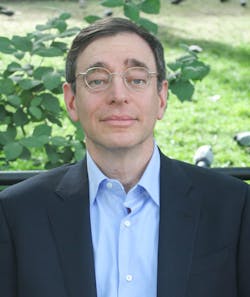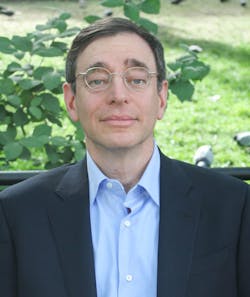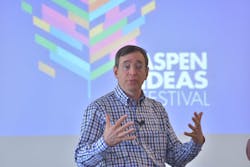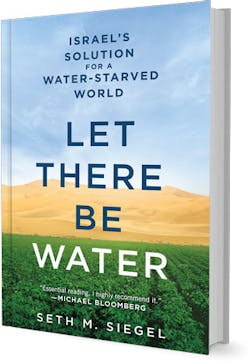The latest instalment in WWi’s #WaterChat series features Seth Siegel: lawyer; activist; entrepreneur; writer and author of the book Let There Be Water, which featured on the New York Times bestseller list. Here he speaks to Tom Freyberg about Israel’s extraordinary quest to improve its water situation.
In a region characterised by water crisis, and indeed globally, Israel stands out for the eagerness with which it has invented, adopted, adapted and improved an innovative mix of solutions that have been harnessed to serve a remarkable social and economic success story. In this conversation, Siegel looks at the foundation of this success, discusses the issues that he highlighted in his book, and looks forward to his compelling vision of a citizen-led movement that he hopes will direct future governments in fostering better, more intelligent use of water and wastewater.
Water & Wastewater International (WWi) magazine: Why did you decide to document the story in Let There Be Water of Israel’s fascinating journey of going from water scarce to perhaps being water abundant?
Seth Siegel (SS): Actually I didn’t sit down to write a story about Israel. It’s true that I’m a businessman, a lawyer and an activist but I’m mostly a concerned citizen; I found myself learning about and worrying about global water supply issues. For about 40 plus years now we’ve had a lot of focus on water quality and I think that that’s very good, and I’m glad we have done that. But we have this growing fear built upon all sorts of smart data, mostly initiated by the US government, some from the UN, that we’re going to be facing global water problems based upon shortages.
And as a result of that I started learning more, I started speaking to public officials, and realising this would require citizens to get engaged and citizens to transform the dialogue, and I decided I’d write a book about it. But what I wanted to do first was not to just simply set up the problem and leave it at that, I wanted to suggest a particular set of solutions.
I realised that in Israel there was a model of a country that’s 60% desert, that has a fast-growing population, dynamic economy and still somehow or other manages to have great surpluses of water - not only making its own water for itself but for its Palestinian neighbours, its Jordanian neighbours, and it has a robust international agricultural export industry. When I put all these pieces together I thought, if we’re going to feed an ever drier, thirstier world we’re going to need role models.
WWi: During the earlier stages [of your book] you mentioned the water carrier project, and you phrased it, which I really like - and I’m going to steal the phrase for myself - a Robin Hood project, taking water from the water-rich areas and piping it to the water-poor, the water-scarce areas, which is fantastic. Why was this project, as you describe it, so significant to really embark on and show how Israel can develop large-scale infrastructure and push it through finance, and get it built, get it developed?
SS: Israel’s a small country and when we speak about the water-rich north we do so with italics because Israel has never been a water-rich country. It has no rivers or great lakes like the Amazon or the Nile that can feed its society. And as a result, and having very great ambitions even when it was a poor and backward state, they realised it was the essential piece to build their economy. Obviously they built up immigration, an absorption system; they built a great education and healthcare system; but in no small way building a water system was a measure of whether or not they would ever really succeed as a country.
And as a result, and needing water, they decided that basically the day they declared a state in May of 1948, despite the enormous security challenges, the fact that they were functionally bankrupt, the fact they were absorbing immigrants at a rate never before seen before in world history.
Israel doubled in size from 1948 to 1952. Despite all of this, I think what we see in the world - as we see in families, as we see in individuals - when people really focus their efforts on a topic, they tend more often than not to have some level of success in that, and I think that is part of why Israel succeed when others did not. Israel made water a central issue to their society, and they came forward.
I think there is another piece to this, at a time when all around the world people have grown cynical about the ability of governments to deliver, and that is having all kinds of implications from the rise in changing political parties to the rise of cynicism in citizens in their governments, to the rise in people checking out and saying they don’t want to be part of the governmental system any more. One of the ways that you can show your citizenry that you are delivering for them is to deliver a great water system.
It’s something that everyone can do, and I think that Israel quietly has proven to its citizenry that, between its security challenges that are overcome routinely and its water quality, people can put their trust in their leadership, and I think that’s really important.
WWi: In your book you mentioned the man Simcha Blass you called “Israel’s Water Man”, he has a really interesting story inventing drip feed irrigation. How much of a revolution was this, and what sort of an impact is it having world-wide?
SS: I would call it a revolution. It’s transformed Israel’s agriculture; Israel is now able to not only utilise far less water for its agriculture than any other on a per capita basis, on a per ton of produce basis. It also has permitted Israel, because of the advancement of drip irrigation water to also advance the delivery of nutrients through a process called nutrient irrigation, also developed in Israel, that allows Israel to grow crops on desert sands. And of course people say it’s impossible, how can you possibly grow crops on barren soil? But Israel figured out a way to use the soil as a way to anchor the seed and the roots, and from there to provide the drip irrigated water and nutrients via the drip irrigation process.
So I’m going to argue that of the great innovations, and there are many that I outline in the book, the most important legacy will be drip irrigation. Although today the rate of adoption is still fairly low, I don’t have any doubt that in the coming years drip irrigation will become the dominant form of irrigation all over the world, including in places that right now utilise flood irrigation.
There’s just too much need for water and too much need to reduce our carbon fuel usage, which cleaning the water and bringing it to the field is a very significant user of, and it has all other kinds of implications for food security, so I don’t really have much doubt that drip irrigation is going to be the saviour.
WWi: How has Israel managed to completely reuse the majority of its wastewater, making it socially acceptable, and using it on such a big scale, because other countries are still looking to catch up to those sorts of rates?
SS: It is an open secret, if you want to use the word secret, everyone could have done it and it wasn’t just a recent decision. In 1952, as I’ve shown in my book, Israeli government officials were already talking about the idea of building a parallel national water system, and they knew it was going to take billions and billions of dollars. But in 1952 they were completely broke, they were in such complete deficit it was a really courageous decision.
What other country in that kind of security crisis, economic crisis, social crisis would then say “okay, now let’s make things even more difficult for ourselves by digging trench lines, putting in pipes and spending money that we don’t have to build the system out”?
But it’s because of that Israel has such a robust agriculture, it’s because of that that Israel is the only country in the world that ended the 20th century with less desert land than it started with. Because it decided that it was going to build a robust culture economy, it was going to water those plants, primarily but not exclusively with water from treated wastewater and they spent a lot of years working on the experimentation and building up the system but boy oh boy, what an incredible result.
WWi: From everything you’ve talked about, from innovation in irrigation through to wastewater reuse, is it a case that necessity is the mother of invention, so the country didn’t really have a choice but to innovate, but to look to take the lead on some of these issues? Do you think that’s part of the reason for their success?
SS: I don’t think that at all. I reject that completely. Obviously if Israel were as water-rich as the UK of legend, or Ireland, they would not have had the incentives to go through the kinds of traumas that they went through.
But what is also true is that lots and lots of other countries that are facing similar problems do not fix their problems - just look at the region Israel is in; one country after another has chosen to hope for the best, or wait for fate, or hope the droughts change, or depress demand by making supplies less. Israel said we want people to have as much water as they do in New York or London, we want to have as many farmers as we need to have so we can have food for everybody and food for export.
So I don’t accept the idea that necessity is the mother of invention, I think that context matters. I think it matters that Israel is in a dry region or they wouldn’t have done the things they did, but given that region I don’t think it was inevitable that they did the things they did, I think that they could have done what others did - which is to say, very little.
And that’s the model for a drying out world. The model for a drying out world is that if everybody is going to face what Israel has faced, and some places in the world are already facing that, there’s great news, we don’t need 80 years to do that, we can just look to Israel and where appropriate absorb those lessons and apply them, wherever we are whether it’s in Africa, South America or wherever. Thousands and thousands of water officials every year make the journey to Israel, as you have done, and learn how to do this stuff.
WWi: There have been other innovations such as cloud seeding; I think Mekorot was one of the first utilities during the 1950s and 1960s to engage in cloud seeding and make it rain over fields?
SS: We talk about cloud seeding as invented in the 50s or maybe even 40s by Kurt Vonnegut’s brother Bernard - if you remember Vonnegut he was the rage in the 70s and 80s, he writes a book called Cat’s Cradle in which he talks about this invention “Ice Nine” which is really a playful jab at his brother for the fact he invented this cloud seeding. But what’s remarkable is that although it’s invented in the United States in General Electric’s laboratories, Israel is among the very first nations to say well what a great idea, how do we start absorbing this and adapting this?
Israel is the country, for example, that invented dual flush toilets, but they didn’t just invent it, they made it mandatory that every public facility and every home renovation has to utilise dual flush toilets, saving just enormous amounts of water every day.
WWi: Finally you said there about not resting on your laurels and looking forward, so what does the future hold for you? Is there a sequel in the works?
SS: It’s interesting, a lot of people assume because I’m a businessman and a lawyer that I was going to jump into this and start making a whole lot of money out of it. While I have no objection to making money I am so agitated over the bad water future in the US, UK, Europe, profoundly in Asia, profoundly in Africa, I am putting my business career on hold for five years to be a town crier.
I am speaking widely: I have spoken at the United Nations twice, I have spoken at Davos, I have spoken at dozens of important universities - Harvard, and Stamford and others. I am also now working on another book, a water book, not about Israel per se - Israel plays a minor role in that book - but very much about what our water problems are and how we’re going to fix them.
How do we fix our agriculture, how do we have to fix our municipal water, what we are doing and not doing properly with our treated sewage. So if the book Let There be Water is a descriptive story of what one country has done to fix its water problems, then surely the next book will be a prescriptive book, which will prescribe to the world what we have to do to get out of these problems. That book, I hope, will be out in a year or so.
In the meantime, in whatever I have of spare time I am toying with creating a citizen’s movement and creating an organisation and will hopefully get a response from our lawmakers. I think it’s foolish to say we have to wait for our leaders to lead. I think there has to be a citizens-led and business-led initiative and then, and only then will the political leaders, especially the timid ones of today, take that leadership.
When you’re an ethical movement as the Israelis were when they were not yet Israelis, when they were just the Zionists, and they were transforming their society and building a new country, you can take steps. Likewise, at the end of World War Two when Europe was destroyed and had to be rebuilt, with great American assistance, we could start on all kinds of new ideas of governance. Yet I would argue that we have fallen into a state of stasis and inertia and that will only change hopefully not through revolution but with citizens awakening to what a terrible water crisis we have ahead of us. And that is really what my next book will be about.
WWi: It sounds as though you yourself are not resting on your laurels, like you mentioned certainly Israel didn’t in the 50s. We wish you every bit of luck with the second book, we hope it is as much of a success as the first book, and also with your continued talks, spreading the word about what Israel did, and how other countries can learn.
SS: Don’t wait till then, you don’t need a special occasion to do this again. Tom, a real pleasure and thank you for your interest.
- 50,000 sold in hardcover, e-book, and audio
- Two hardcover printings to date
- Quality paperback to be released
- 12 foreign language editions secured
- 170+ speaking engagements since the book’s release in over 50 cities in 20 US states
- 200+ media appearances, interviews, reviews and quotes.
Tom Freyberg is chief editor of WWI magazine.
More Water & WasteWater International Archives Issue Articles
About the Author

Tom Freyberg
Tom Freyberg is an experienced environmental journalist, having worked across a variety of business-to-business titles. Since joining Pennwell in 2010, he has been influential in developing international partnerships for the water brand and has overseen digital developments, including 360 degree video case studies. He has interviewed high level figures, including NYSE CEO’s and Environmental Ministers. A known figure in the global water industry, Tom has chaired and spoken at conferences around the world, from Helsinki, to London and Singapore. An English graduate from Exeter University, Tom completed his PMA journalism training in London.



